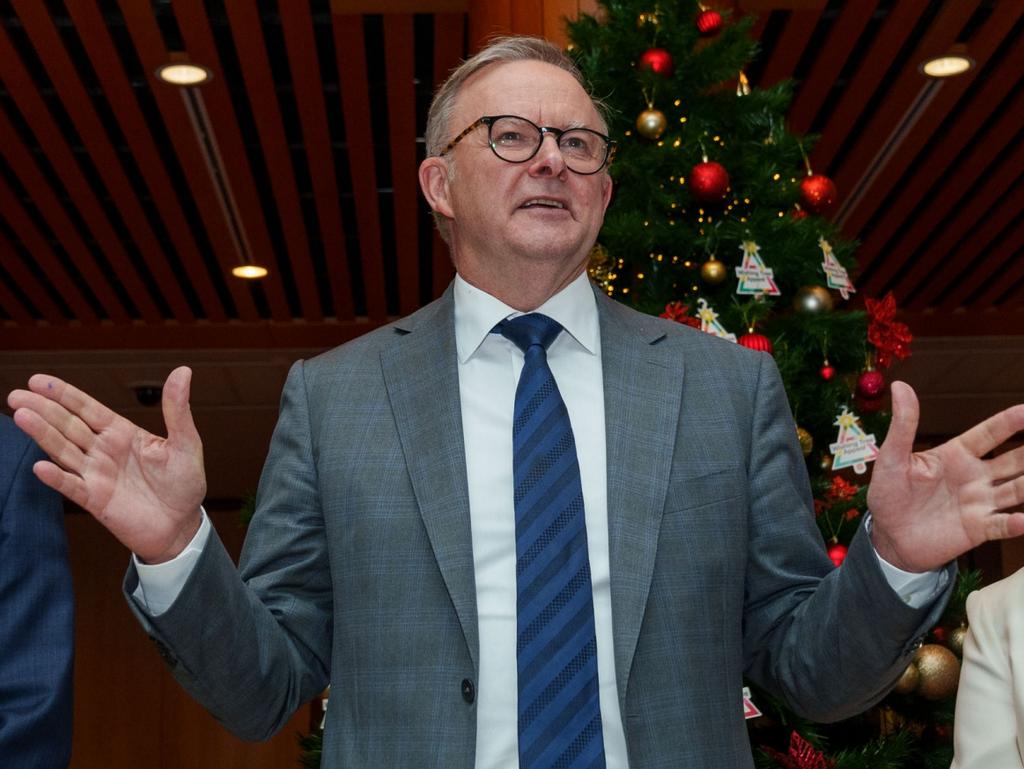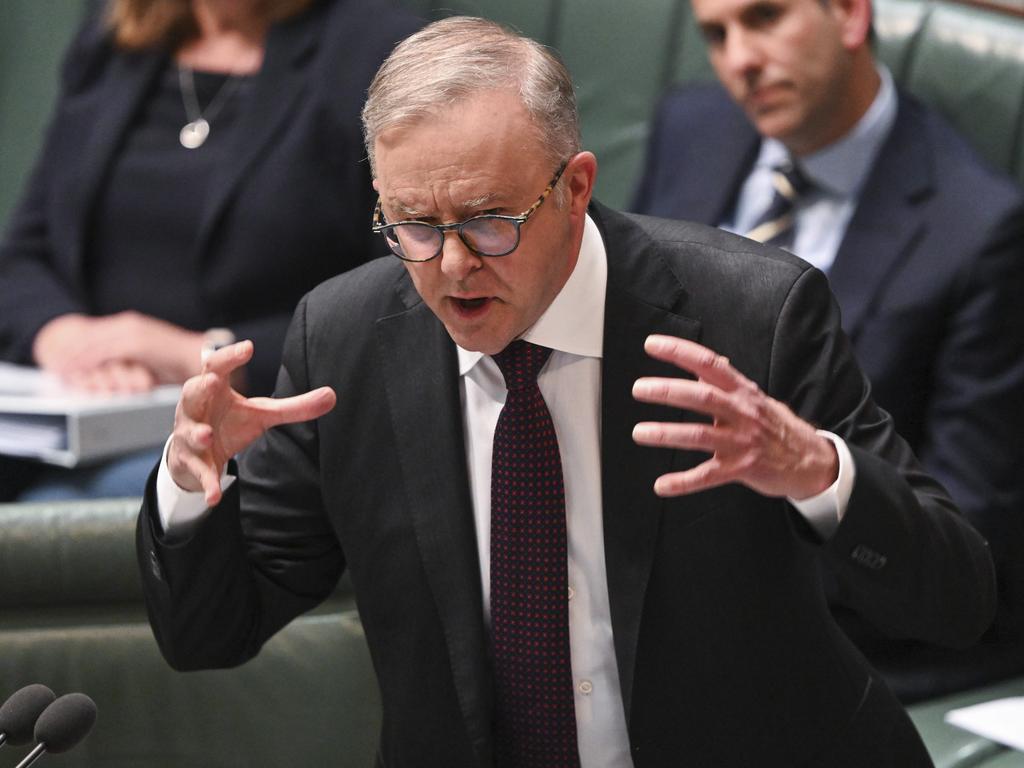Peter Dutton’s time to strike is now as Anthony Albanese bungles policy


The government’s contortions over the 141-plus foreign criminals it has released into the community are a case in point.
The government knew the High Court was likely to rule against the indefinite detention of a stateless person, a convicted child rapist known only as NZYQ, and initially sought to circumvent an adverse ruling by deporting him to a third country.
But when that didn’t work out, it failed to develop a plan B. As the furore grew over the release on to our streets of numerous foreign criminals who had no right to be here, including murderers, rapists and pedophiles, Home Affairs Minister Clare O’Neil first falsely claimed the government was caught flat-footed because it had been advised it would win the case.
Then she said there was nothing that could be done because “you can’t out-legislate the High Court”. Then she introduced legislation that she claimed was the toughest and fastest ever, only to have to accept a series of opposition amendments to strengthen it, such as mandatory reporting requirements and ankle bracelets.
And even after the government’s self-proclaimed leap from impotence to faux-toughness, there was more.
First it turned out some criminals had been released without ankle bracelets; then it turned out that at least one had simply refused to wear an ankle bracelet and had been allowed to abscond without one. Then, once the court’s judgment was issued, it turned out ongoing detention would likely be permitted after all provided immigration detainees had an “unacceptable risk of reoffending”.
And finally it turned out – if the opposition’s take on the court’s decision is right – that the court had not, in fact, required the release of anyone other than NZYQ, meaning every other criminal released is because this incompetent minister panicked and a Prime Minister who had always been soft on borders didn’t object.
The upshot of all this is that the Albanese government has needlessly exposed the community to an unacceptable risk and lied about it. What has been abundantly on display is ministers who are out of their depth and a Prime Minister who won’t take charge.

And in politics, almost nothing is more obviously manufactured than bluster to mask the weakness and ineptitude that have been on display ever since this issue broke.
Underlying it all is a sense that the government might actually have been relieved at a court decision that could be made to justify releasing immigration detainees, thus appeasing the activist lobby inside Labor Party branches.
Add in the arrival last week of a boatload of asylum-seekers, the first to get to the Australian mainland in a decade, that could not have come at a worse time because it has compounded the reviving suspicions that Labor is incorrigibly soft on illegal migration.
Voters normally give first-term governments the benefit of the doubt. As well, governments can normally ride out rocky periods if the public thinks they’re basically right on the big issues. Albanese, though, never established a strong political brand in opposition, other than to stress that he wasn’t Scott Morrison.
That means he’s more readily damaged by obvious failure, such as the catastrophic loss of his signature voice referendum and the monumental broken promise to cut power bills by $275 per household a year.
This Prime Minister doesn’t have an accumulated store of goodwill to assuage voters hammered by cost-of-living pressure, such as home buyers whose mortgage repayments have nearly doubled since the election, especially when the government is making a bad situation worse through its own policies.
The renewable energy crusade, with transmission lines through pristine bush and prime agricultural land, and ugly wind turbines off the coast disrupting whale migration and decimating bird life, is starting to alienate the conservation forces it’s supposed to please.
Then there’s the increased risk of blackouts this summer as coal-fired power stations age and there’s no gas back-up for intermittent wind and solar energy (because to buy off the Greens the ALP is now anti-gas, too).
On the industrial relations front, changes to workplace laws are more about union paybacks for millions in electoral donations than any real wins for workers and will do nothing to boost our productivity, which the Reserve Bank warns is critical to get inflation under control and sustain our prosperity.

Finally, there’s the government’s instinct to try to buy votes with cash from taxpayers – robbing Peter to pay Paul – on every perceived problem, such subsidised electricity bills, instead of addressing the underlying cause, in this case unachievable targets on renewables that can’t be met, will cost us hundreds of billions, do virtually nothing about lowering emissions and just make us even more energy vulnerable as a nation.
Unlike former Queensland premier Peter Beattie, who made a virtue of owning his government’s mistakes, or former prime minister John Howard, who revived a flagging first-term government with tax reform boldness, this Prime Minister’s response to vicissitudes has been to get on a plane rather than to get behind his desk and do the job needed to reset his government.
That might work if our leader is looking dominant on the world stage but, instead, he’s just derided as a “handsome boy”, reluctant to confront the Chinese dictator over deliberate injuries to Australian sailors. For Albanese right now, the trouble with the perception that he is not up to the job is that it starts to become self-reinforcing.
Of course, political success doesn’t require absolute excellence in government, just basic competence plus voter sentiment that the opposition could be even worse. But right now, not even this is working in the government’s favour.

Peter Dutton’s decision to oppose the voice back in April when it still had 60 per cent support showed a rare disposition to do what’s right rather than what’s merely politically expedient. And his success in out-arguing and out-campaigning the Prime Minister should have given the Opposition Leader the confidence to create a clear and compelling contrast on other issues, too.
We can see he’s the one driving the mop-up of the government’s detainee mess, but it’s more than that. There’s a push inside the opposition for a bigger, bolder version of Morrison’s super for housing policy. There’s a growing understanding that it’s now legal rather than illegal immigration that’s out-of-control, driven not by our national interest but by universities’ business model. And last week the Coalition energy spokesman flagged a policy centred on no further retirements of coal-fired power, rapid development of new gas fields and an end to the nuclear ban.
What’s not to like in policies that turn renters into owners, put the government rather than unaccountable institutions back in charge, and make it affordable to keep the lights on?
If Dutton can get these policies into voters’ minds without much internal dissent, Labor really will be in trouble.







“Prediction is very difficult,” Nobel laureate physicist Niels Bohr said, “especially if it’s about the future.” Even so, there’s one forecast that’s becoming easier to make: namely that Anthony Albanese will lead a one-term government.